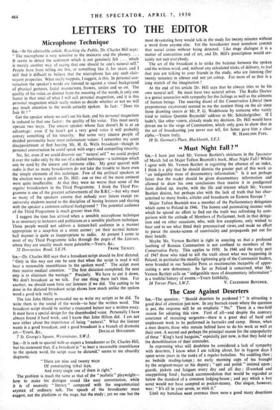LETTERS TO THE EDITOR Microphone Technique Sia,—In his admirable article,
Reaching the Public, Dr. Charles Hill says:
" The microphone is very sensitive to the insincere and the phoney. .. . It seems to detect the sentiment which is not genuinely felt . . . which is merely another way of saying that one should be one's natural self."
People have been telling me this, or something like it, for years, and I still find it difficult to believe that the microphone has any such clair-
voyant properties. 'What really happens, I suggest, is this. In personal con- versation the speaker's words are listened to against a visual background of physical gestures, facial mannerisms, frowns, smiles and so on. The quality of his voice, as distinct from the meaning of the words, is only one factor in that total of what I will call personal magnetism, and it is this personal magnetism which really makes us decide whether or not we will pay much attention to the words actually spoken. In fact: "Does his face fit ? "
Get the speaker where we can't see his face, and his personal magnetism is reduced to that one factor: the quality of his voice. This must surely operate two ways. The sincere speaker whose face doesn't fit is at an advantage: even if he hasn't got a very- good voice it will probably convey something of his sincerity. But some very sincere people of decided personality have most unfortunate voices: I remember my acute disappointment at first hearing Mr. H. G. Wells broadcast—though in personal conversation he could speak with angry and compelling sincerity.
No, Sir, even if we could discover our "natural self" we could project it over the radio only by the use of a skilled technique—a technique which can be used by the sincere and insincere alike. My great quarrel with radio is that so many broadcasters do not take the trouble to learn even the simple elements of this technique. Few of the political speakers at the election were a patch on Dr. Hill: one or two of the more eminent were quite insufferable. At that they were no worse than some of the regular broadcasters in the Third Programme. I think the Third Pro- gramme is one of the greatest achievements of the B.B.C.—but why must so many of the speakers assume that nobody ever listens except ex- university students inured to the discipline of boring lectures and sharing with the speaker a common cultural background ? The potential audience of the Third Programme is much greater than this.
I suggest the time has arrived when a sensible microphone technique Is as necessary to lecturers and politicians as a sensible platform technique. These people would not address a lecture-hall audience in a manner appropriate to a soap-box at a street corner: yet their normal lecture- hall manner is quite as inappropriate to radio. At present I come to most of my Third Programme talks through the pages of the Listener, where they are usually much more palatable.—Yours, &c.,






































 Previous page
Previous page